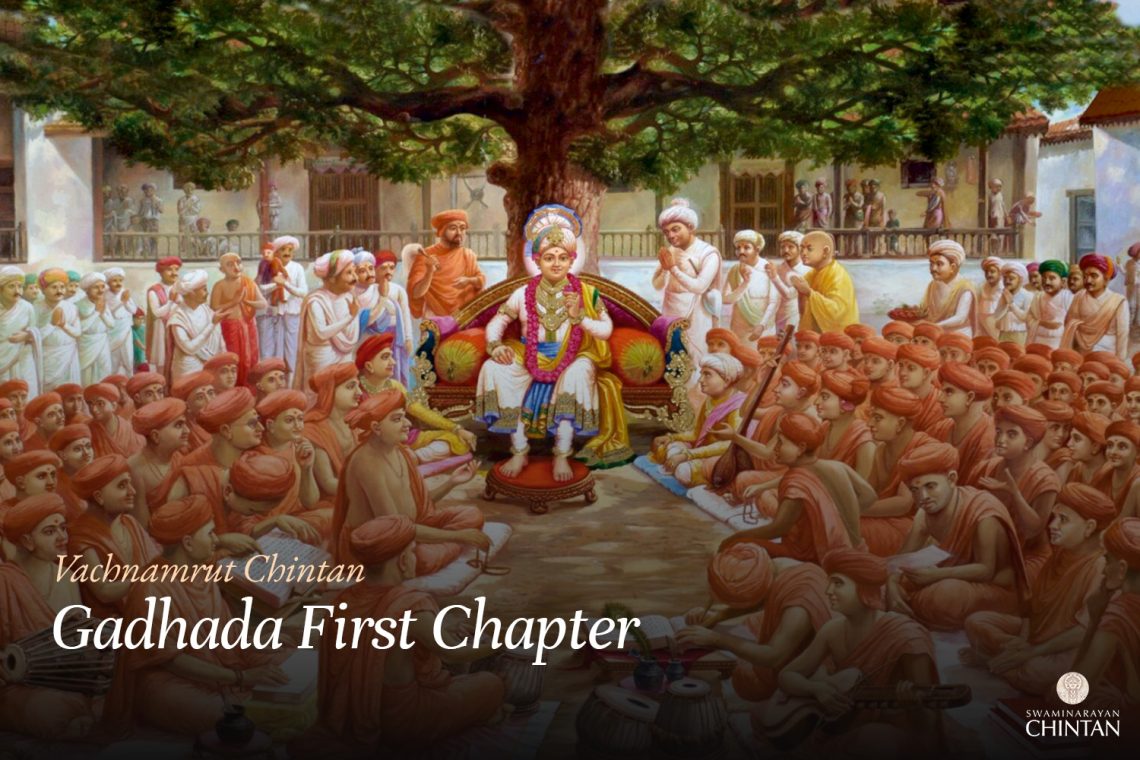Central Insights:
- Understanding is measured in time of hardship
Key Points:
- In the presence of a desirous person, vairāgya (non-attachment) is tested
- In periods of hard times, understanding is tested
Explanation
In this Vachanāmrut, Shreeji Māharāj says that The extent of a person’s vairāgya and understanding, can be measured only when he encounters vishays (object of five senses), or in times of hardship, but not otherwise. That being so, what can be said about situations of extreme happiness or hardship? For example, everyone must have realised the state of their own antahkarans during the minor difficulty that recently fell upon Dãdã Khãchar.
Here Māharāj says that in the path of Vairagya’s test is the arrival of desires of this world. In the absence of the objects of five senses, common vairāgya and intense vairāgya both appear to be the same. The distinction between standard and strong is not apparent. When a much-desired object is obtained then a standard renounced person will begin to falter but a person with strong vairāgya will not waiver. They will not accept the desired objects. Dislike for accommodations advances vairāgya and supports it; however, vairāgya is tested when desired objects are received. Absence of facilities/comforts increases the vairāgya, which is helpful. Understanding is tested during hardships, and during times of peril.
Understanding means firm faith in oneself, to hold a divine memory of God and His devotee, to make sacrifices for them. This is tested during times of hardships. Dãdã Khãchar had few problems. According to tradition we come to know that Dãdã Khãchar had a conflict with Bhāṇ khāchar. It is also heard that there was pressure and disruption of the Bhavnagar Darbār due to the increase in fees. The occasion may be different, but Māharāj says that in such difficult times we can get to know one’s inner self or conscience.
Tulsidāsji says:
धीरज धर्म मित्र अरु नारी आपत काल परीख अहि चारी
dhīraja dharma mitra aru nārī āpata kāla parikhi ahiṁ cārī
Patience, righteousness (Dharma), friendship and relationships are tested during times of hardships. Having the side of devotees also comes during times of hardships. During the good times, all will support and stand with devotees or sing their praises, but this is not a true heartfelt gesture. Being in the side of Devotees and supporting even in the times if his hardships is a true sign.
In the difficult times of Dãdã Khãchar, those who were with and against him were made clear. It also showed him who was selfish and who were his true friends. Those who have Mahima (greatness) and unwavering support will. Those who do not have Mahima will move away and return when the hardships subside and offer their condolences.
It is natural that in a person’s heart, he sides with Bhagvãn’s bhaktas, with the understanding that if satsaṅg flourishes, many people will benefit; but if the satsaṅg suffers a setback in any way, no one will benefit. That is why joy and grief are experienced. Shreeji Māharāj said, the florishment and setback of satsaṅg is by the wish of God. So, considering this as the wish of God one should not be joyful or sorrowful. One should commit good efforts. Have love at the feet of God. We many wish for the upliftment of satsaṅg, but what is the wish of Māharāj! Which we do not know. Thus, by the results we could guess this could be the wish of Māharāj and have patience, do the devotion of God. Also, if God seats us on an elephant, we should be happy; and if He seats us on a donkey, then we should also remain happy. Even a dry leaf cannot move without the wish of God. With this one should not have over joy and sorrows in mind.
Here, the meaning of understanding is patience and dedication. Having ātmanisthā (believing oneself as soul, not body) results in patience. Understanding the greatness of God and his devotees results in samarpan (dedication). In the save of Muktānand Swami there is no option in case of patience; but feeling joyful and sorrow with the flourishment and setback of satsaṅg or devotee of God. Ātmanisthā remains firm but Māharāj says consider this to be the wish of God and remain pleased.
Glossary
| Antahkaran – Inner faculties |
| Atmanishtha – Steadfastness in the realization of the soul |
| Mahima – The understanding of Bhagwan’s supreme glory, inspiring steadfast devotion and loyalty. |
| Samarpan – Dedication Total surrender to God and His devotees. |
| Satsang – Holy Fellowship Association with saints and devotees to grow spiritually. |
| Vairagya – Detachment From Everything Except God |
| Vishays – Sensory Objects The objects of the five senses (sound, touch, sight, taste, and smell). |

